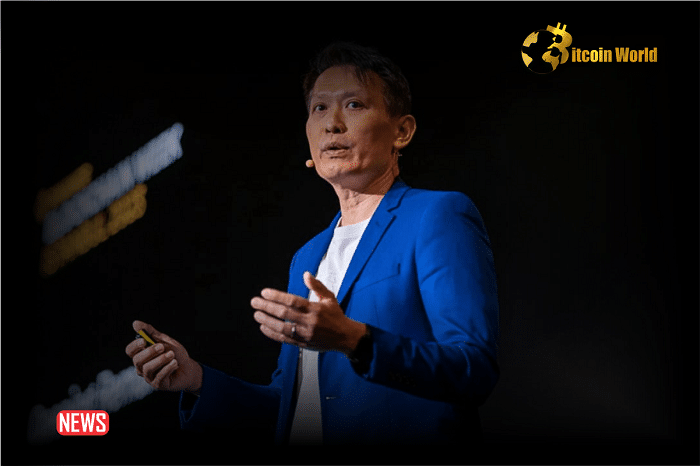Is Binance, one of the world’s leading cryptocurrency exchanges, really facing a staggering $10 billion fine in Nigeria? That’s the question on everyone’s lips in the crypto world right now. Let’s dive into the unfolding saga between Binance and the Nigerian government, separating fact from speculation and understanding what this means for the future of crypto in Africa’s most populous nation.
Binance Responds to $10 Billion Fine Claims: What’s the Real Story?
Recent headlines have been ablaze with reports of a massive $10 billion fine slapped on Binance by the Nigerian government. This news sent ripples through the crypto community, raising concerns about regulatory pressures and the future of Binance’s operations in Nigeria. However, Binance has stepped forward to firmly deny these allegations.
In a clear statement, Binance refuted claims made by a Nigerian government official regarding the hefty fine. While acknowledging ongoing discussions with Nigerian authorities, Binance emphasized its commitment to a positive relationship but stressed it would not be strong-armed into paying fines for the release of its detained executives.
Key Points from Binance’s Denial:
- No $10 Billion Fine Accepted: Binance explicitly denies being asked to pay or agreeing to a $10 billion fine.
- Discussions Underway: Binance confirms it is engaged in discussions with the Nigerian government to resolve issues related to its affiliate’s activities.
- Commitment to Nigeria: Binance reiterates its desire to maintain a good relationship with the Nigerian government and people.
- No Payment for Executive Release: Binance will not pay fines as a condition for the release of its detained executives.
See Also: Nigeria Denies Report Of $10B Binance Fine
The Nigerian Government’s Perspective: From Fine to Retraction?
The initial report of the $10 billion fine came from Bayo Onanuga, a Nigerian presidential advisor. His announcement marked a significant escalation in the ongoing friction between Binance and the Nigerian government. This followed the detention of two senior Binance executives upon their arrival in Nigeria, adding fuel to the fire.
Nigerian officials, including the Central Bank of Nigeria (CBN) governor, have been vocal in their criticism of Binance, and the government has implemented measures impacting the exchange’s operations within the country. These actions suggest a growing scrutiny of cryptocurrency exchanges and their role in the Nigerian financial landscape.
The Plot Twist: Retraction of the $10 Billion Claim
In a surprising turn of events, Bayo Onanuga appeared to retract his initial statement about the $10 billion fine. He accused the media of misrepresenting his comments made to the BBC, stating he never explicitly mentioned the fine or that Binance was informed of it.
This retraction adds a layer of complexity to the situation. Was the $10 billion figure a miscommunication, a negotiating tactic, or simply inaccurate information? The uncertainty leaves the crypto community wondering about the true nature of the Nigerian government’s demands.
See Also: Nigeria Asks Binance To Pay $10 Billion Fine
Detained Executives and Information Sharing: Collaboration or Coercion?
Adding another layer to this intricate situation is the detention of Binance executives. Reports initially suggested they were being pressured to reveal the identities of their Nigerian users. However, Onanuga refuted these claims, stating that the executives “collaborated with the government to provide information.”
The exact nature of this collaboration and whether the executives are still in detention remains unclear. This aspect raises concerns about data privacy and the extent to which governments can demand user information from cryptocurrency exchanges.
What Does This Mean for the Future?
The Binance-Nigeria saga highlights the evolving relationship between cryptocurrency exchanges and national governments. It underscores the increasing regulatory scrutiny faced by the crypto industry globally, particularly in regions where governments are grappling with issues like currency devaluation and capital controls.
Key Takeaways and Potential Implications:
- Regulatory Uncertainty: The situation underscores the volatile regulatory landscape for cryptocurrencies, especially in emerging markets.
- Government Scrutiny: Governments are increasingly paying closer attention to crypto exchanges and their operations within their borders.
- Compliance Challenges: Crypto exchanges face the challenge of navigating diverse and sometimes conflicting regulatory demands across different jurisdictions.
- Impact on Users: Such disputes can create uncertainty for crypto users in the affected regions.
- Need for Dialogue: Open communication and collaboration between crypto exchanges and governments are crucial for finding mutually acceptable solutions.
In Conclusion: Navigating the Complexities of Crypto Regulation
The Binance-Nigeria situation is a dynamic and unfolding story. While Binance denies the $10 billion fine and seeks constructive dialogue, the Nigerian government’s stance remains somewhat ambiguous following the retraction. The detention of executives and the demands for information add further layers of complexity.
This case serves as a crucial reminder of the ongoing negotiations between the crypto world and traditional regulatory frameworks. As governments worldwide grapple with how to regulate digital currencies, the Binance-Nigeria scenario offers valuable insights into the challenges and potential pathways forward. The crypto community will be watching closely to see how this situation resolves and what precedents it sets for the future of crypto regulation globally.
Disclaimer: The information provided is not trading advice. Bitcoinworld.co.in holds no liability for any investments made based on the information provided on this page. We strongly recommend independent research and/or consultation with a qualified professional before making any investment decisions.
#Binance #WRITE2EARN
Disclaimer: The information provided is not trading advice, Bitcoinworld.co.in holds no liability for any investments made based on the information provided on this page. We strongly recommend independent research and/or consultation with a qualified professional before making any investment decisions.



